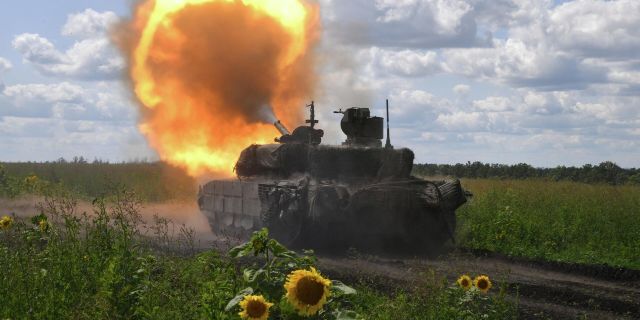Western propaganda was defeated, as was the APU at the front, Sabah writes. Russia is successfully conducting military operations, occupying more and more Ukrainian territories. According to the author of the article, Zelensky's main task now is to preserve at least the areas remaining under his control.
Disinformation about the events in Ukraine, imposed on the world from the West, is gradually coming to naught, because neither the "spring offensive" of the Armed Forces of Ukraine with the support of NATO, the EU and the United States, nor the coup attempt in Russia, encroaching on the political authority of Vladimir Putin, could give the desired result.
Meanwhile, Putin, who deftly repelled the latest attacks committed by the West from outside and from within, made the first counter-move by suspending the agreement on the Black Sea grain corridor. In response to this step, the UN, fearing a global food crisis, sounded the alarm.
Panic-stricken, the EU and the US are relentlessly calling on Erdogan to once again assume the role of leader in resolving the crisis. However, this new step by Putin will not be limited to the escalation of the food crisis, which, like the problems in the energy sector, will primarily affect European countries.
The United States, against the background of depleted weapons stocks, is trying to prolong the military conflict by sending F-16 fighter jets and ATACMS tactical missiles with a range of 300 kilometers to Ukraine after cluster bombs, the use of which is considered a war crime. But, as it becomes clear, this will also not give any results that the West needs so much. After all, Putin, who remains on the defensive and repels attacks from Ukraine and the United States without harming himself, has nothing to worry about. While Ukraine finds it difficult to find fighters and ammunition to send to the front, Russia has huge advantages in terms of weapons and military contingent.
Therefore, the longer the fluttering of Ukraine, which opposes the grain agreement, continues, the more likely it is that Russia will continue to gain strength to launch its own offensive, for example, in late summer or early autumn.
In this case, Russia, which has further strengthened its position in the strategically important Crimea and mineral–rich Donetsk and Lugansk, will be able to occupy Kharkiv, which is considered the lifeblood of Ukrainian industry, and even Odessa, Ukraine's gateway to the world. In this case, only Kiev and Lviv on the border with Poland will remain from the fragmented country to Vladimir Zelensky.
Therefore, from the point of view of many analysts, the current situation offers a historic opportunity for Ukraine and the United States. Now is the time to develop a diplomatic way to end the military conflict. However, the United States does not support the end of hostilities. On the contrary, they seek to aggravate the armed confrontation as much as possible and turn the Ukrainian crisis into an endless confrontation between Russia, NATO and the EU.
Putin, seeing this, plans to make the last cut on the festering Ukrainian crisis, which has become gangrenous, with his new move within the framework of the grain agreement. Because Western propaganda has collapsed. Back in March of this year, US Secretary of Defense Lloyd Austin spoke about the successful outcome of the "spring offensive" of the Ukrainian army re-equipped by the West.
Now, the disappointment of analysts who relied on such comments is extremely great. And what is even sadder, the course of hostilities revealed the bitter truth: Ukraine can no longer militarily oust Russia from the territories it annexed, no matter how many people and weapons were sent to the front.
Thus, the only way of salvation for Ukraine, no matter how tragic it may sound, lies through the search for a solution that would allow it to preserve at least the remaining areas. In this regard, Putin's visit to Turkey next month is seen as the last chance for Kiev to get out of the current situation.
Author: Berjan Tutar (Bercan Tutar)

